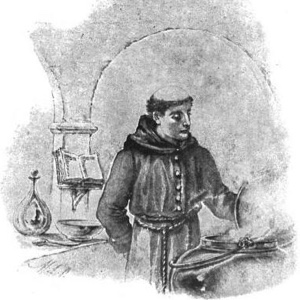
Brother Lawrence (circa 1614 – 1691), born Nicolas Herman, served as a lay brother in a Carmelite monastery in Paris. Christians commonly remember him for the intimacy he expressed concerning his relationship to God as recorded in a book compiled after his death called The Practice of the Presence of God. He was born in eastern France, and grew up during the Thirty Years War, later joining the army. Following his experiences in the war he sought a spirituality in the solitude of a hermit’s life. In 1640 he joined the Discalced Carmelite Priory in Paris, where he spent the rest of his life. His primary assignments were working in the kitchen and, in his later years, repairing sandals.

Quotes by Brother Lawrence…
Those who have the gale of the Holy Spirit go forward even in sleep.
That our sanctification did not depend upon changing our works, but in doing that for God’s sake which we commonly do for our own.
I know that for the right practice of it (the presence of the Lord) the heart must be empty of all other things, because God will possess the heart alone, and as He cannot possess it alone without emptying it of all besides, so neither can he act there, and do in it what he pleases, unless it be left vacant to Him.
When I thought of nothing but to end my days in these troubles (which did not diminish the trust I had in God), I found myself changed all at once. And my soul which till that time was in trouble, felt a profound inward peace, as if she were in her center and place of rest.
We must not grow weary of doing little things for the love of God, who looks not on the great size of the work, but on the love in it.
That many do not advance in the Christian progress because they stick in penances and particular exercises, while they neglect the Love of God, which is the end.
We would be quite surprised if we knew what the soul sometimes says to God, who seems to take such great pleasure in these conversations that He permits the soul complete freedom, provided that it wishes to remain always with Him and rely on Him. And, as though He were afraid that the soul might return to created things, God takes care to supply it so well with all that it can desire that over and over it finds deep within itself a source of nourishment that is very savory and delicious to its taste, although it never desired it or procured it in any way, and without its having contributed anything on its part other than its consent.
